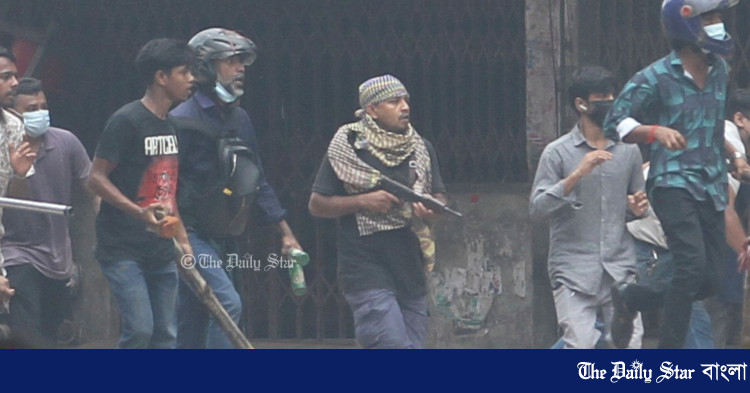Saif
Senior Member
- Messages
- 17,442
- Likes
- 8,381
- Nation

- Residence

- Axis Group


চট্টগ্রাম: তাদের হাতে যেসব অস্ত্র দেখা গেল
সংঘর্ষে রণক্ষেত্র ছিল নিউমার্কেট ও এর আশেপাশের এলাকা।
চট্টগ্রাম: তাদের হাতে যেসব অস্ত্র দেখা গেল
সংঘর্ষে রণক্ষেত্র ছিল নিউমার্কেট ও এর আশেপাশের এলাকা।

দুপুর সাড়ে ১২টার দিকে তিনপুলের মাথায় আন্দোলনকারীদের সঙ্গে সরকারদলীয় লোকজনের দফায় দফায় সংঘর্ষ হয়। সেসময় ছাত্রলীগ ও আওয়ামী লীগের নেতাকর্মীদের হাতে বন্দুক, পিস্তলসহ নানা অগ্নেয়াস্ত্র দেখা যায়। ছবি: স্টার
বৈষম্যবিরোধী ছাত্র আন্দোলনের ডাকা অসহযোগ আন্দোলনের প্রথম দিন চট্টগ্রাম নগরীর বিভিন্ন এলাকায় বিক্ষোভকারী, পুলিশ ও সরকার সমর্থকদের মধ্যে দফায় দফায় সংঘর্ষের ঘটনা ঘটেছে। এতে অর্ধশতাধিক গুলিবিদ্ধ হওয়াসহ আহত হয়েছেন শতাধিক মানুষ।
সংঘর্ষে রণক্ষেত্র ছিল নিউমার্কেট ও এর আশেপাশের এলাকা। বিকেলের দিকে নগরীর আগ্রাবাদ ও সন্ধ্যায় বহদ্দারহাট এলাকায় সংঘর্ষের ঘটনা ঘটে।

ছাত্রলীগ ও আওয়ামী লীগের নেতাকর্মীদের হাতে বন্দুক, পিস্তলসহ নানা অগ্নেয়াস্ত্র দেখা যায়। ছবি: স্টার
রোববার সকাল ১১টায় নিউমার্কেট এলাকায় পাল্টাপাল্টি কর্মসূচির ডাক দেয় বৈষম্যবিরোধী ছাত্র আন্দোলন ও আওয়ামী লীগ।
প্রত্যক্ষদর্শীরা জানান, সকাল ১০টা থেকেই নিউমার্কেট এলাকায় বিক্ষোভকারীরা জড়ো হতে শুরু করে। সেখানে সাধারণ শিক্ষার্থীদের সঙ্গে সাধারণ মানুষকেও অবস্থান করতে দেখা যায়। সকাল ১১টার দিকে পুলিশ টিয়ারশেল ও সাউন্ড গ্রেনেড ছুড়লে আন্দোলনকারীদের সঙ্গে পুলিশের ধাওয়া-পাল্টা ধাওয়া শুরু হয়, যা পরে সংঘর্ষে রূপ নেয়। এর মধ্যে নিউমার্কেট মোড় এলাকায় আওয়ামী লীগ, যুবলীগ ও ছাত্রলীগের কর্মীরা অবস্থান নেন। সংঘর্ষ ছড়িয়ে পড়ে নিউমার্কেটসহ এর আশেপাশের এলাকায়।

ছাত্রলীগ ও আওয়ামী লীগের নেতাকর্মীদের হাতে বন্দুক, পিস্তলসহ নানা অগ্নেয়াস্ত্র দেখা যায়। ছবি: স্টার
দুপুর সাড়ে ১২টার দিকে তিনপুলের মাথায় আন্দোলনকারীদের সঙ্গে সরকারদলীয় লোকজনের দফায় দফায় সংঘর্ষ হয়। সেসময় ছাত্রলীগ ও আওয়ামী লীগের নেতাকর্মীদের হাতে বন্দুক, পিস্তলসহ নানা অগ্নেয়াস্ত্র দেখা যায়। দুপুর ১টা থেকে ২টা পর্যন্ত প্রায় এক ঘণ্টা ধরে গোলাম রসূল মার্কেটের সামনে এ সংঘর্ষ হয়েছে। সেসময় প্রচন্ড গুলির শব্দ ও ককটেল বিস্ফোরণের শব্দ শোনা যায়।
সরেজমিনে দেখা গেছে, তিনপুলের মাথায় এ সংঘর্ষের সময় কোনো পুলিশ সেখানে ছিল না। দুপুর ২টার দিকে নিউমার্কেট থেকে পুলিশের দুটো গাড়ি সেদিকে যায়। বিকেল ৫টা পর্যন্ত নগরীর কেন্দ্রীয় শহীদ মিনার, এনায়েত বাজার, রিয়াজুদ্দিন বাজার, তিনপুলের মাথা, বিআরটিসি ফলমন্ডি এলাকা অর্থাৎ নিউ মার্কেটের আশেপাশের এলাকাজুড়ে পুলিশ-আন্দোলনকারী ও সরকার দলীয় লোকজনের মধ্যে সংঘর্ষের ঘটনা ঘটেছে।

ছাত্রলীগ ও আওয়ামী লীগের নেতাকর্মীদের হাতে বন্দুক, পিস্তলসহ নানা অগ্নেয়াস্ত্র দেখা যায়। ছবি: স্টার
সন্ধ্যা ৬টার দিকে ষোলশহর ও বহদ্দারহাট মোড়ে ভাঙচুর-সংঘর্ষ হয়েছে। রাত ৮টার দিকে আগ্রাবাদ মোড়ে আন্দোলনকারীরা জড়ো হয়ে ট্রাফিক পুলিশ বক্স ভাঙচুর ও আগুন দেয়।
ডবলমুরিং থানার সহকারী কমিশনার সব্যসাচী মজুমদার ডেইলি স্টারকে বলেন, 'রাত ৮টার পরে আন্দোলনকারীরা ডবলমুরিং থানায় ইট-পাটকেল মেরে ভেতরে ঢুকতে চেয়েছিল। পুলিশ টিয়ারশেল দিয়ে তাদেরকে ছত্রভঙ্গ করে দেয়।'

ছাত্রলীগ ও আওয়ামী লীগের নেতাকর্মীদের হাতে বন্দুক, পিস্তলসহ নানা অগ্নেয়াস্ত্র দেখা যায়। ছবি: স্টার
থানা হামলার আরেকটি ঘটনা ঘটেছে লোহাগড়া থানায়।
জেলা পুলিশ সুপার সুদীপ্ত সরকার বলেন, 'বিকেলে লোহাগড়া থানায় হামলার চেষ্টা করা হচ্ছিল। টিয়ারশেল, সাউন্ড গ্রেনেড দিয়ে তাদের ছত্রভঙ্গ করা হয়েছে।'

ছাত্রলীগ ও আওয়ামী লীগের নেতাকর্মীদের হাতে বন্দুক, পিস্তলসহ নানা অগ্নেয়াস্ত্র দেখা যায়। ছবি: স্টার
দিনভর দফায় দফায় সংঘর্ষে গুলিবিদ্ধ হয়েছেন অন্তত অর্ধশতাধিক। চট্টগ্রামে মেডিকেল কলেজ হাসপাতালে গুলিবিদ্ধ ও আহতের অনেকেই চিকিৎসা নিচ্ছেন।

ছাত্রলীগ ও আওয়ামী লীগের নেতাকর্মীদের হাতে বন্দুক, পিস্তলসহ নানা অগ্নেয়াস্ত্র দেখা যায়। ছবি: স্টার
সর্বশেষ রাত ১০টায়ও নগরীর কিছু এলাকায় থেমে থেমে সংঘর্ষ, সংঘাতের খবর পাওয়া যাচ্ছে। নগরীজুড়ে থমথমে পরিবেশ বিরাজ করছে।
সংঘর্ষে রণক্ষেত্র ছিল নিউমার্কেট ও এর আশেপাশের এলাকা।
দুপুর সাড়ে ১২টার দিকে তিনপুলের মাথায় আন্দোলনকারীদের সঙ্গে সরকারদলীয় লোকজনের দফায় দফায় সংঘর্ষ হয়। সেসময় ছাত্রলীগ ও আওয়ামী লীগের নেতাকর্মীদের হাতে বন্দুক, পিস্তলসহ নানা অগ্নেয়াস্ত্র দেখা যায়। ছবি: স্টার
বৈষম্যবিরোধী ছাত্র আন্দোলনের ডাকা অসহযোগ আন্দোলনের প্রথম দিন চট্টগ্রাম নগরীর বিভিন্ন এলাকায় বিক্ষোভকারী, পুলিশ ও সরকার সমর্থকদের মধ্যে দফায় দফায় সংঘর্ষের ঘটনা ঘটেছে। এতে অর্ধশতাধিক গুলিবিদ্ধ হওয়াসহ আহত হয়েছেন শতাধিক মানুষ।
সংঘর্ষে রণক্ষেত্র ছিল নিউমার্কেট ও এর আশেপাশের এলাকা। বিকেলের দিকে নগরীর আগ্রাবাদ ও সন্ধ্যায় বহদ্দারহাট এলাকায় সংঘর্ষের ঘটনা ঘটে।
ছাত্রলীগ ও আওয়ামী লীগের নেতাকর্মীদের হাতে বন্দুক, পিস্তলসহ নানা অগ্নেয়াস্ত্র দেখা যায়। ছবি: স্টার
রোববার সকাল ১১টায় নিউমার্কেট এলাকায় পাল্টাপাল্টি কর্মসূচির ডাক দেয় বৈষম্যবিরোধী ছাত্র আন্দোলন ও আওয়ামী লীগ।
প্রত্যক্ষদর্শীরা জানান, সকাল ১০টা থেকেই নিউমার্কেট এলাকায় বিক্ষোভকারীরা জড়ো হতে শুরু করে। সেখানে সাধারণ শিক্ষার্থীদের সঙ্গে সাধারণ মানুষকেও অবস্থান করতে দেখা যায়। সকাল ১১টার দিকে পুলিশ টিয়ারশেল ও সাউন্ড গ্রেনেড ছুড়লে আন্দোলনকারীদের সঙ্গে পুলিশের ধাওয়া-পাল্টা ধাওয়া শুরু হয়, যা পরে সংঘর্ষে রূপ নেয়। এর মধ্যে নিউমার্কেট মোড় এলাকায় আওয়ামী লীগ, যুবলীগ ও ছাত্রলীগের কর্মীরা অবস্থান নেন। সংঘর্ষ ছড়িয়ে পড়ে নিউমার্কেটসহ এর আশেপাশের এলাকায়।
ছাত্রলীগ ও আওয়ামী লীগের নেতাকর্মীদের হাতে বন্দুক, পিস্তলসহ নানা অগ্নেয়াস্ত্র দেখা যায়। ছবি: স্টার
দুপুর সাড়ে ১২টার দিকে তিনপুলের মাথায় আন্দোলনকারীদের সঙ্গে সরকারদলীয় লোকজনের দফায় দফায় সংঘর্ষ হয়। সেসময় ছাত্রলীগ ও আওয়ামী লীগের নেতাকর্মীদের হাতে বন্দুক, পিস্তলসহ নানা অগ্নেয়াস্ত্র দেখা যায়। দুপুর ১টা থেকে ২টা পর্যন্ত প্রায় এক ঘণ্টা ধরে গোলাম রসূল মার্কেটের সামনে এ সংঘর্ষ হয়েছে। সেসময় প্রচন্ড গুলির শব্দ ও ককটেল বিস্ফোরণের শব্দ শোনা যায়।
সরেজমিনে দেখা গেছে, তিনপুলের মাথায় এ সংঘর্ষের সময় কোনো পুলিশ সেখানে ছিল না। দুপুর ২টার দিকে নিউমার্কেট থেকে পুলিশের দুটো গাড়ি সেদিকে যায়। বিকেল ৫টা পর্যন্ত নগরীর কেন্দ্রীয় শহীদ মিনার, এনায়েত বাজার, রিয়াজুদ্দিন বাজার, তিনপুলের মাথা, বিআরটিসি ফলমন্ডি এলাকা অর্থাৎ নিউ মার্কেটের আশেপাশের এলাকাজুড়ে পুলিশ-আন্দোলনকারী ও সরকার দলীয় লোকজনের মধ্যে সংঘর্ষের ঘটনা ঘটেছে।
ছাত্রলীগ ও আওয়ামী লীগের নেতাকর্মীদের হাতে বন্দুক, পিস্তলসহ নানা অগ্নেয়াস্ত্র দেখা যায়। ছবি: স্টার
সন্ধ্যা ৬টার দিকে ষোলশহর ও বহদ্দারহাট মোড়ে ভাঙচুর-সংঘর্ষ হয়েছে। রাত ৮টার দিকে আগ্রাবাদ মোড়ে আন্দোলনকারীরা জড়ো হয়ে ট্রাফিক পুলিশ বক্স ভাঙচুর ও আগুন দেয়।
ডবলমুরিং থানার সহকারী কমিশনার সব্যসাচী মজুমদার ডেইলি স্টারকে বলেন, 'রাত ৮টার পরে আন্দোলনকারীরা ডবলমুরিং থানায় ইট-পাটকেল মেরে ভেতরে ঢুকতে চেয়েছিল। পুলিশ টিয়ারশেল দিয়ে তাদেরকে ছত্রভঙ্গ করে দেয়।'
ছাত্রলীগ ও আওয়ামী লীগের নেতাকর্মীদের হাতে বন্দুক, পিস্তলসহ নানা অগ্নেয়াস্ত্র দেখা যায়। ছবি: স্টার
থানা হামলার আরেকটি ঘটনা ঘটেছে লোহাগড়া থানায়।
জেলা পুলিশ সুপার সুদীপ্ত সরকার বলেন, 'বিকেলে লোহাগড়া থানায় হামলার চেষ্টা করা হচ্ছিল। টিয়ারশেল, সাউন্ড গ্রেনেড দিয়ে তাদের ছত্রভঙ্গ করা হয়েছে।'
ছাত্রলীগ ও আওয়ামী লীগের নেতাকর্মীদের হাতে বন্দুক, পিস্তলসহ নানা অগ্নেয়াস্ত্র দেখা যায়। ছবি: স্টার
দিনভর দফায় দফায় সংঘর্ষে গুলিবিদ্ধ হয়েছেন অন্তত অর্ধশতাধিক। চট্টগ্রামে মেডিকেল কলেজ হাসপাতালে গুলিবিদ্ধ ও আহতের অনেকেই চিকিৎসা নিচ্ছেন।
ছাত্রলীগ ও আওয়ামী লীগের নেতাকর্মীদের হাতে বন্দুক, পিস্তলসহ নানা অগ্নেয়াস্ত্র দেখা যায়। ছবি: স্টার
সর্বশেষ রাত ১০টায়ও নগরীর কিছু এলাকায় থেমে থেমে সংঘর্ষ, সংঘাতের খবর পাওয়া যাচ্ছে। নগরীজুড়ে থমথমে পরিবেশ বিরাজ করছে।



